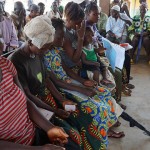Case Studies on Contemporary Social Issues book by Barry Hewlett and Bonnie Hewlett.
In this case study, readers will embark on an improbable journey through the heart of Africa to discover how indigenous people cope with the rapid-killing Ebola virus. The Hewletts are the first anthropologists ever invited by the World Health Organization to join a medical intervention team and assist in efforts to control an Ebola outbreak. Their account addresses political, structural, psychological, and cultural factors, along with conventional intervention protocols as problematic to achieving medical objectives. They find obvious historical and cultural answers to otherwise-puzzling questions about why village people often flee, refuse to cooperate, and sometimes physically attack members of intervention teams. Perhaps surprisingly, readers will discover how some cultural practices of local people are helpful and should be incorporated into control procedures. The authors shed new light on a continuing debate about the motivation for human behavior by showing how local responses to epidemics are rooted both in culture and in human nature. Well-supported recommendations emerge from a comparative analysis of Central African cases and pandemics worldwide to suggest how the United States and other countries might use anthropologists and the insights of anthropologists to mount more effective public health campaigns, with particular attention to avian flu and bioterrorism.
Barry Hewlett and Bonnie Hewlett / 2014 / Wadsworth
